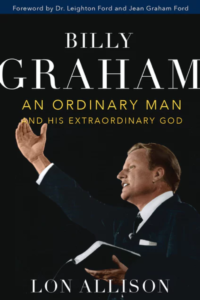FREE shipping on orders of $200+
Quantity discounts and shipping details here.
Racial Justice, Peace Not War, Human Suffering | Billy Graham: An Ordinary Man and His Extraordinary God by Lon Allison
This week’s blog is an excerpt from Billy Graham: An Ordinary Man and His Extraordinary God by Lon Allison. The chapter is titled Racial Justice, Peace Not War, Human Suffering and discusses Rev. Billy Graham’s relationship with Dr. Martin Luther King, Jr.
—
… The other person God would use to educate Billy on this journey was the famous Reverend Martin Luther King Jr. Leighton Ford, who was heading up communications with churches in New York City in the summer of 1957, remembers that unlike invitations from many other cities, the invitation to come to New York had been offered by the Protestant council of pastors, which included many men of color. Racial Justice, Peace Not War, Human Suffering
The invitation and the connection with both Martin Luther King Jr. and Clarence B. Jones (King’s lawyer and close personal advisor) probably came to Billy by way of these men. Leighton sent a telegram to Dr. King asking if he would be willing to be on the platform and pray an invocational prayer at the beginning of one of the Madison Square Garden events. King agreed, and on July 18, 1957, he and Billy were on a crusade dais together. Over time, a friendship blossomed between the men. Billy would also have Dr. King speak to his executive staff on retreat to educate them more on racial justice. And for his part, it seems that King learned from Billy how to better hold large rallies, and Billy’s organizational structures and training were offered to him as well. At one point, the two men wondered if they should even travel together promoting the fullness of the kingdom of God: both changed hearts (the new birth) and changed societies where right replaces wrong. Billy writes:
Early on, Dr. King and I spoke about his method of using nonviolent demonstrations to bring an end to racial segregation. He urged me to keep on doing what I was doing—preaching the gospel to integrated audiences and supporting his goals by example, and not to join him in the streets. “You stay in the stadiums, Billy,” he said, “because you will have far more impact on the white establishment there than you would if you marched in the streets. Besides that, you have a constituency that will listen to you, especially among white people, who may not listen so much to me. But if a leader gets too far ahead of his people, they will lose sight of him and not follow him any longer.” I followed his advice.
It was also during the New York City crusade of 1957 that President Dwight D. Eisenhower called and asked Billy’s advice regarding sending National Guard troops to Little Rock, Arkansas, in order to enforce desegregation laws. Billy’s answer was, “I think you’ve got to, Mr. President. You’ve got no other alternative. The discrimination must be stopped.”
In 1960, Dr. King and Graham were again together, in Brazil for the Baptist World Alliance meetings. During that time, Billy arranged a special dinner for King to meet with US Southern Baptist leaders to try and bridge the chasm between blacks and whites in the American South. “Our friendly relationship with Mike [Dr. King had by this time asked Billy to call him Mike as his other friends did] made the point with my Baptist friends,” Billy records in Just as I Am. There were, no doubt, times when King wished Billy would be more pronounced and public regarding racial discrimination, and there were probably times when Graham wished King would tone down his rhetoric, going slower on social justice, and preach the new birth in Christ more. Yet the friendship between the men was genuine.
Toward the end of his autobiography, Billy writes of the day he heard Dr. King had died. He was in Australia in the spring of 1968 preaching crusades, but taking an afternoon off to play golf, when journalists ran up and informed him that Dr. King had been shot in Memphis. They asked for a comment. “I was almost in a state of shock,” Billy writes. “Not only was I losing a friend through a vicious and senseless killing, but America was losing a social leader and a prophet, and I felt his death would be one of the greatest tragedies in our history. There on the golf course I had all the journalists and the others gathered around, and we bowed in prayer for Dr. King’s family, for the United States, and for the healing of the racial divisions of our world. I immediately looked into canceling my schedule and returning for the funeral, but it was impossible because of the great distance.” Billy devoted his life to proclaiming the Good News of the changed heart brought about by Jesus Christ in all who love and know him. His own heart, and that of his team, were changed in regard to justice, equality, and racial diversity by special men like Martin Luther King Jr…

